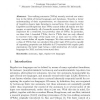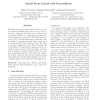268 search results - page 14 / 54 » Expressive Power of Grammatical Formalisms |
INLG
2010
Springer
13 years 6 months ago
2010
Springer
The generation of referring expressions (GRE), an important subtask of Natural Language Generation (NLG) is to generate phrases that uniquely identify domain entities. Until recen...
ICALP
2000
Springer
14 years 3 days ago
2000
Springer
Abstract. Tree-walking automata (TWAs) recently received new attention in the fields of formal languages and databases. Towards a better understanding of their expressiveness, we c...
EACL
1989
ACL Anthology
13 years 9 months ago
1989
ACL Anthology
Koskenniemi's model of two-level morphology has been very influential in recent years, but definitions of the formalism have generally been phrased in terms of a compilation ...
TIME
1997
IEEE
14 years 21 days ago
1997
IEEE
Kowalski and Sergot’s Event Calculus (EC) is a simple temporal formalism that, given a set of event occurrences, allows the derivation of the maximal validity intervals (MVIs) o...
ENTCS
2008
13 years 8 months ago
2008
Logic meta-programming in Prolog is a powerful way to express program analysis and transformation. However, its use can be difficult and error-prone because it requires programmer...


